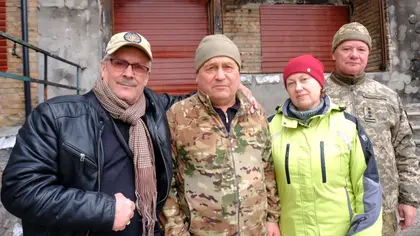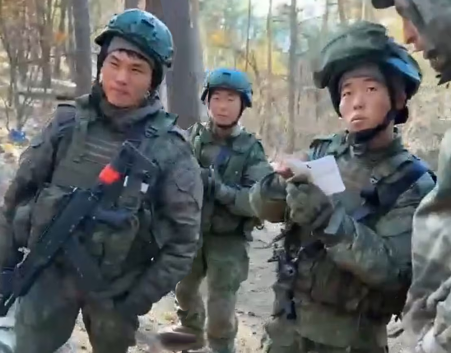A s Ukrainian President Zelensky toured Bucha with the prime ministers of the Czech Republic, Slovakia and Slovenia on the first anniversary of its liberation from invading Russian forces, a few citizens who defended the northwestern Kyiv suburb chatted over coffee at their rebuilt, Novus supermarket.
Volodymyr Scherbinin, 67, retired Col. Petro Mazin, 61, his wife, Olena, and Richard Hoover-Bachynsky, 65, a Canadian filmmaker who lived through Bucha’s brutal occupation, discussed the events of one year ago and solemnly remembered the hundreds of murdered people in their community.
- Look at the latest Ukraine news that was released today.
- Receive the latest Ukraine news bulletins for today.
JOIN US ON TELEGRAM
Follow our coverage of the war on the @Kyivpost_official.
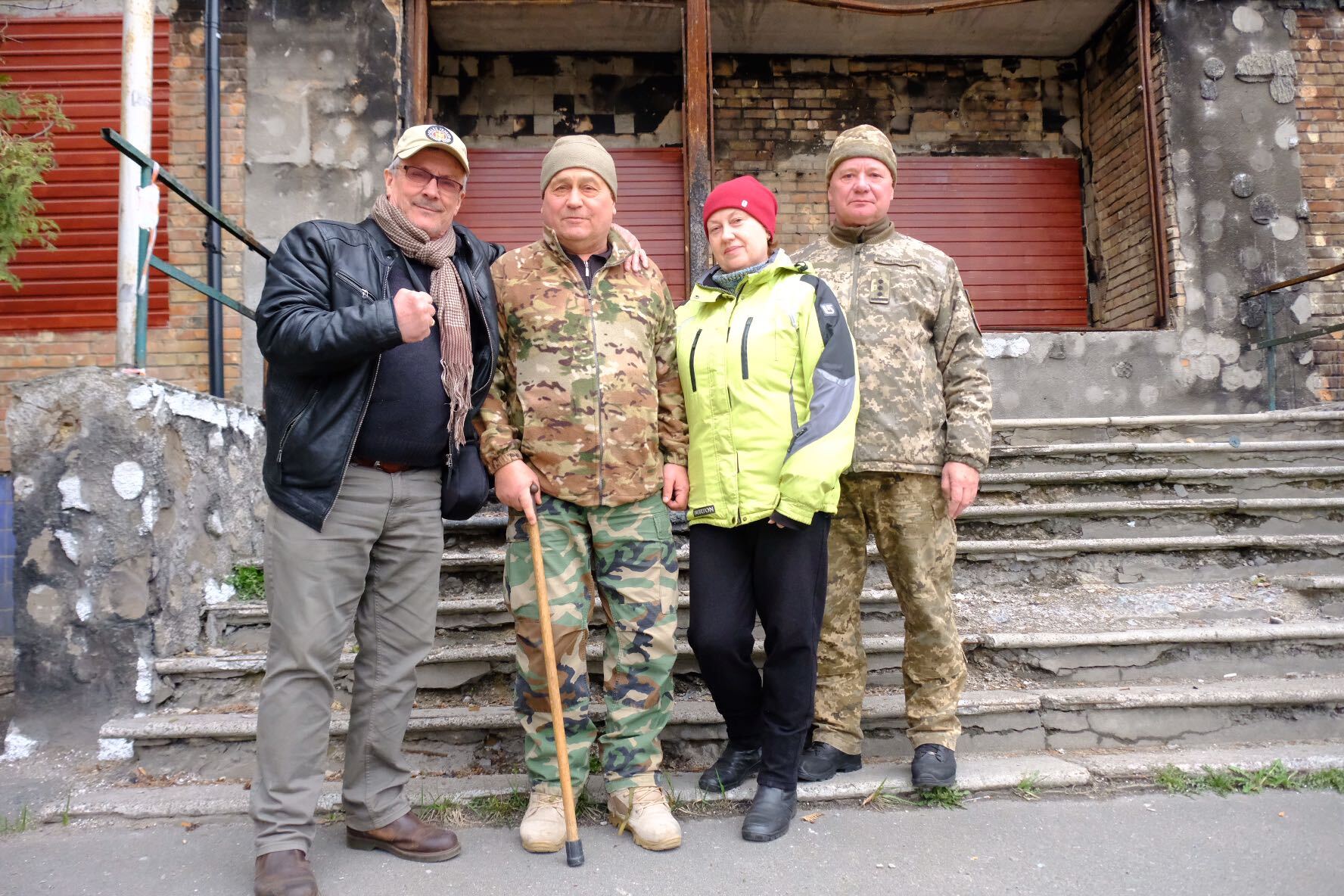
Richard Hoover-Bachynsky (from left), Volodymyr Scherbinin, Olena Mazin and retired Col. Petro Mazin are pictured in the Kyiv suburb of Bucha on March 31 during the one-year anniversary of its liberation from invading Russian forces. PHOTO: Kyiv Post
From the start of the full-scale invasion in February 2022, Scherbinin and the colonel, both pensioners, were leaders of BuchaVarta, a local civil defense unit. Grabbing whatever weaponry they could access, the resistance group mobilized as soon as they realized that Russian paratroopers were descending on the nearby Hostomel airport.
“In the 2004 Orange Revolution, we saw the aggressor use Hostomel to sneak their people out of the country,” said Scherbinin, a long-term community organizer. “We knew an escalation was coming. We fought as part of the ATO (Ukraine’s Anti-Terrorist Operation), so we knew they would go for Hostomel and therefore Bucha. Put it all together, and there was no real surprise there.”

For the Record – Comments from Biden, NATO Secretary General
Hoover-Bachynsky, who has lived in Bucha for eight years, kept supplies going to members of the voluntary militia unit, as well as 15 neighbor families taking shelter in the basement of his nearby building, when there was no food, water, heat or electricity elsewhere.
The group first met several years ago when the Canadian film producer helped them plant trees to commemorate all the Ukrainian fallen soldiers and citizens in Donbas since 2014, where they and their comrades had all fought, or helped out as volunteers.
They also made some 80 supply missions to the easternmost region comprised of the Luhansk and Donetsk oblasts.
While resting his hands on a timber cane at the café, Scherbinin recounted, “For whatever reason, all the regular defense and security forces left Bucha as the Russian onslaught came. So, we’ve been organized since the Maidan protests [of 2013-2014] and took the action we had to take.”
He is still recovering from being shot three times in skirmishes with Russian troops.
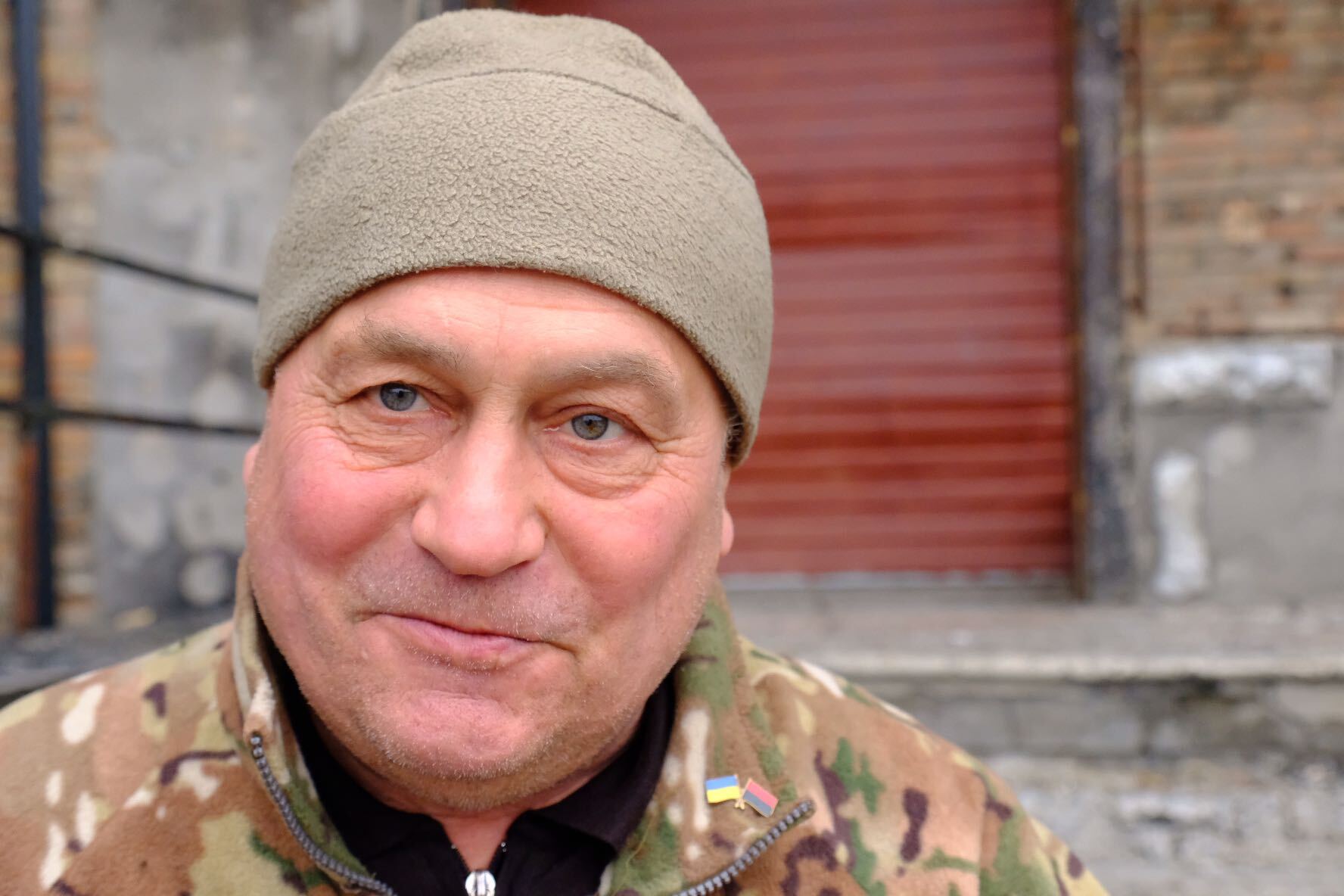
Retired Ukrainian Col. Volodymyr Scherbinin in Bucha, Kyiv region, on March 31. PHOTO:Kyiv Post
On any given day during the occupation, as the Russians tried to tighten control of the town, members of BuchaVarta – many of them pensioners and plumbers – would wreak havoc on the Russian lines.
Between sips of coffee, the gentlemen showed a video of a burning BTR armored personnel carrier from two blocks away. Using local intelligence, they had hidden behind a typical concrete fence and struck the armored vehicle with Molotov cocktails.
Retribution and the targeting of local activists was swift.
The Russians came to the block of units where Scherbinin lives. Under the pretext of searching for him, they robbed every apartment in his five-story building, as they did throughout much of the war-torn town.
Together with photographs of executed people lying on nearby Zablunska Street, the images of Russian soldiers carrying looted goods from Bucha homes became an international symbol of the full-scale invasion.
“What did surprise us, and shouldn’t have, was the Russians’ brutality. It was without any limit. It was a combination of Buryats [an ethnic group from Siberia] as muscle with Kadyrovites [a term for Chechen fighters] enforcing the killings and punishments, like the Gestapo from the Second World War,” Scherbinin said.
Meanwhile, Hoover-Bachynsky was doing everything he could to keep his neighbors, friends and own young family, including his 14-year-old son, Yevhen, alive.
Running low on supplies, he resorted to breaking into an abandoned McDonalds eatery and raided leftover food. On the way back, his arms full with dozens of stale buns and big blocks of cheese, he needed to evade two Russian soldiers who wanted to stop him.
“By the first week of March, as the Russian tightened their control, they just started hunting people, people they knew were nationalists. You could hear their shots all day long. We lost many friends that way,” Hoover-Bachynsky said.
“In that first week of March under occupation, we stuck together as best we could. One day, we found out that it was the birthday of a three-year old from our building who was in the shelter with us. There was of course no cake. So, we gave her some sprinkled donuts that I’d grabbed from McDonalds and sang ‘Happy Birthday’ in English as the artillery was going off in the background. I told her not to pay attention to the bombs. That’s just fireworks for your birthday,” Hoover-Bachynsky recalled telling her.
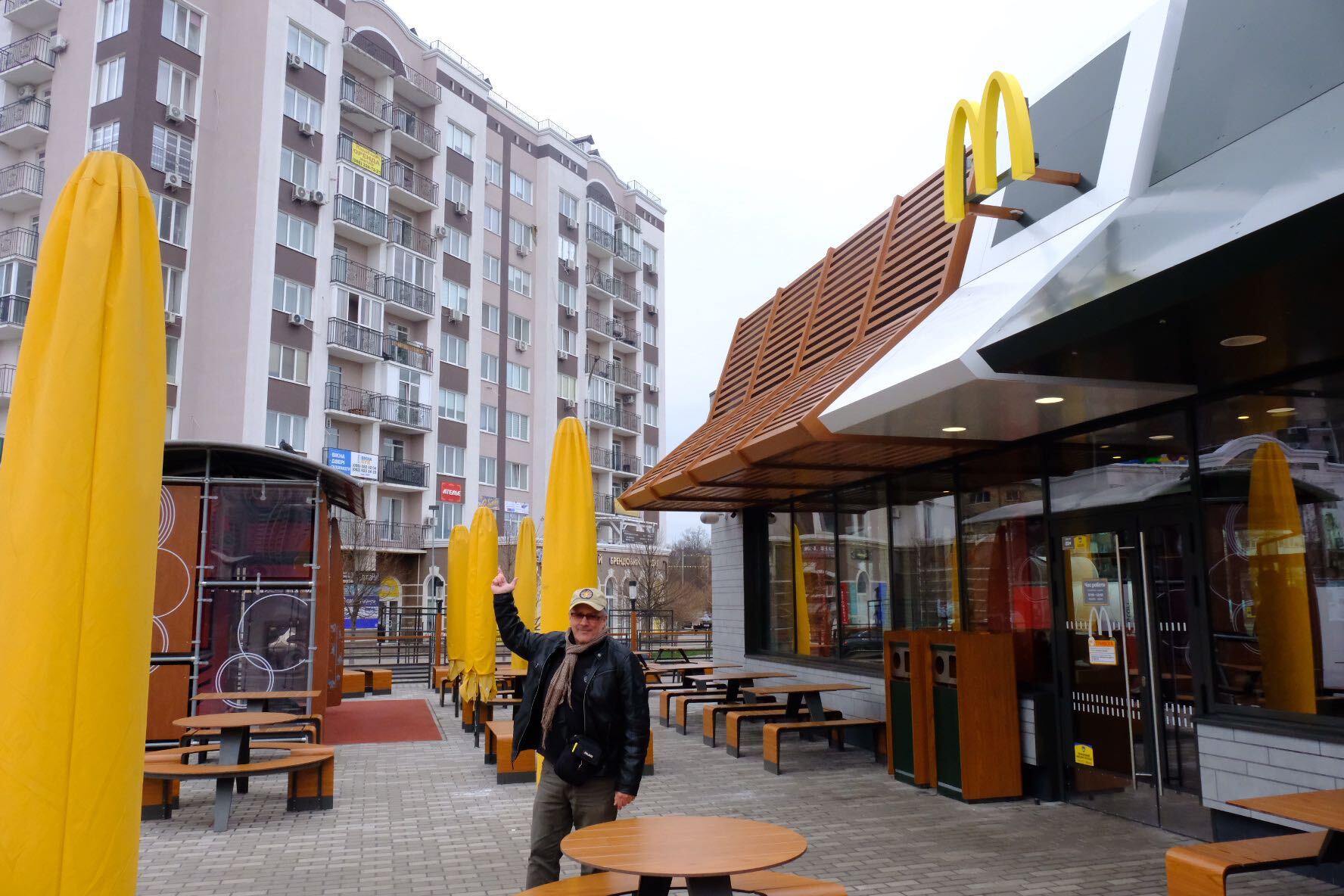
Canadian national Richard Hoover-Bachynsky on March 31 stands outside a McDonald’s restaurant where he scavenged for food in Bucha, Kyiv region to survive during Russia’s one-month long occupation of the town. PHOTO: Kyiv Post
The Canadian of Ukrainian descent came to Ukraine in part to find family roots. His western Canadian father was orphaned as a young man and essentially removed from family connections by the notorious Ukrainian Labor Temple movement, a Communist front in the Canadian diaspora.
“My father and I knew nothing about our family and our Ukrainian roots. So I started to fill in the blank canvas. That led to me being here for the Orange Revolution and then Maidan. The Russian Communists tried to wipe out my dad’s life and identity, so I’m giving them hell in return,” Hoover-Bachynsky said.
He had taken part in the tragic events of November 2013 to February 2014 when more than 100 protestors were killed by pro-Russian security forces during the so-called Maidan Revolution of Dignity.
“I was on Instytutska Street as Berkut [riot police] snipers cut people down from the top of the hill. I remember their corpses just leaning against trees and street poles. I’ve made a movie about the [manmade famine of 1932-1933] Holodomor in Ukraine. I know from experience and from studying history how brutal and merciless Russians can be in their quest to destroy Ukrainians. That kind of genocidal intent repeated itself again here in Bucha,” Hoover-Bachynsky said.
He is currently developing a new film project that tells the story of the town during occupation and now recovery, which is evident everywhere. He recalls many members of BuchaVarta who lost their lives in local combat, including right outside the windows of his apartment.
As they enter the thoroughly modern and well-stocked supermarket, younger men in full military gear and local residents come over to shake the older guys’ hands. Respect is given and kind words are exchanged.
“Those of us who have a military connection, we all got harder during the invasion and the occupation. Now, though I think of myself as a peaceful man, I would readily execute aggressors and collaborators. But the regular community, in some ways, it’s grown kinder. People have seen death and now they do more to look after each other in life,” Scherbinin said.
The group walked over to the destroyed building that served as their headquarters during the events of last year. A Kyiv Post reporter asked them what they would say to Zelensky if they had the chance.
“That the events of Bucha at the beginning of the war brought our people together and showed that we can fight the Russians, not only with weapons but also with our spirit… Here we saw the true face of the so-called ‘Russkiy myr’,” Scherbinin said, referring to the Russian word for 'peace'.
The former military officer and his wife were quieter during the conversation with the buoyant Canadian and the articulate Scherbinin.
Later in the chat, the Mazins revealed that they lost a son during combat near Sumy during the war. Their daughter-in-law now continues to serve in the military while they look after their grandchildren in Bucha.
The retired colonel paid tribute to Ukraine’s defenders and then said: “Russian fascism will not come – it will not succeed.”
Hoover-Bachynsky summed it up: “These guys are heroes".
You can also highlight the text and press Ctrl + Enter


